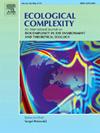Transitive and intransitive structures in competition-based ecological communities
IF 3.1
3区 环境科学与生态学
Q2 ECOLOGY
引用次数: 0
Abstract
Based on the classical idea that no two species can occupy the same niche, ecological communities are frequently assumed to be structured according to the rules of interspecific competition, based on the intuition provided by the Lotka/Volterra competition equations in two dimensions. It has been noted that when three or more species are involved, the usual tacit assumption that all competition is transitive may be violated. Intransitive loops change some of the emergent principles of the competition-based framework of community structure. Since the intransitivity is oscillatory, the convenient stable equilibrium approach to communities is altered and oscillatory behavior of the system needs to be acknowledged. It is likely that real communities, especially if they are relatively large, will contain one or more intransitive structures, along with normal transitivities. Here we examine some theoretical constructs that emanate from the joint consideration of intransitive and transitive structures co-occurring in an ecological community.
基于竞争的生态群落中的传递性和非传递性结构
根据 "没有两个物种可以占据相同的生态位 "这一经典观点,生态群落通常被假定为按照种间竞争规则来构建,其依据是二维洛特卡/沃尔特拉竞争方程所提供的直觉。人们注意到,当涉及三个或更多物种时,通常默认的所有竞争都是反式竞争的假设可能会被打破。不传递循环改变了基于竞争的群落结构框架的一些显现原则。由于不传递性是振荡的,因此改变了群落的稳定平衡方法,需要承认系统的振荡行为。现实中的群落,尤其是规模相对较大的群落,很可能包含一个或多个不传递结构,以及正常的传递性。在此,我们将对生态群落中同时存在的非传递性结构和传递性结构进行联合研究,并在此基础上提出一些理论构想。
本文章由计算机程序翻译,如有差异,请以英文原文为准。
求助全文
约1分钟内获得全文
求助全文
来源期刊

Ecological Complexity
环境科学-生态学
CiteScore
7.10
自引率
0.00%
发文量
24
审稿时长
3 months
期刊介绍:
Ecological Complexity is an international journal devoted to the publication of high quality, peer-reviewed articles on all aspects of biocomplexity in the environment, theoretical ecology, and special issues on topics of current interest. The scope of the journal is wide and interdisciplinary with an integrated and quantitative approach. The journal particularly encourages submission of papers that integrate natural and social processes at appropriately broad spatio-temporal scales.
Ecological Complexity will publish research into the following areas:
• All aspects of biocomplexity in the environment and theoretical ecology
• Ecosystems and biospheres as complex adaptive systems
• Self-organization of spatially extended ecosystems
• Emergent properties and structures of complex ecosystems
• Ecological pattern formation in space and time
• The role of biophysical constraints and evolutionary attractors on species assemblages
• Ecological scaling (scale invariance, scale covariance and across scale dynamics), allometry, and hierarchy theory
• Ecological topology and networks
• Studies towards an ecology of complex systems
• Complex systems approaches for the study of dynamic human-environment interactions
• Using knowledge of nonlinear phenomena to better guide policy development for adaptation strategies and mitigation to environmental change
• New tools and methods for studying ecological complexity
 求助内容:
求助内容: 应助结果提醒方式:
应助结果提醒方式:


